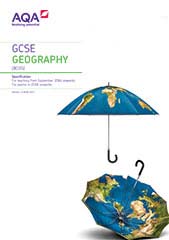3.3 Geographical applications
The Geographical applications unit is designed to be synoptic in that students will be required to draw together knowledge, understanding and skills from the full course of study. It is an opportunity for students to show their breadth of understanding and an evaluative appreciation of the interrelationships between different aspects of geographical study.
Section A: Issue evaluation
This section contributes a critical thinking and problem-solving element to the assessment structure. The assessment will provide students with the opportunity to demonstrate geographical skills and applied knowledge and understanding by looking at a particular issue(s) derived from the specification using secondary sources.
The issue(s) will arise from any aspect of the compulsory sections of the subject content but may extend beyond it through the use of resources in relation to specific unseen contexts. Students develop knowledge and understanding of physical geography themes in unit 3.1 and human geography themes in unit 3.2. This section is synoptic and the assessment will require students to use their learning of more than one of the themes in units 3.1 and 3.2 so that they can analyse a geographical issue at a range of scales, consider and select a possible option in relation to the issue(s) and justify their decision.
A resource booklet will be available twelve weeks before the date of the exam so that students have the opportunity to work through the resources, enabling them to become familiar with the material. Students will not be allowed to take the original resource booklet into the examination room but will be issued with a clean copy in the exam. Sources could include maps at different scales, diagrams, graphs, statistics, photographs, satellite images, sketches, extracts from published materials, and quotes from different interest groups.
Assessment will consist of a series of questions related to a contemporary geographical issue(s), leading to a more extended piece of writing which will involve an evaluative judgement. Students will apply knowledge and understanding to interpret, analyse and evaluate the information and issue(s) in the pre-release resources booklet and the question paper. They will also use geographical skills to set the issue(s) in context and to examine conflicting viewpoints about the issue(s).
Students will develop a critical perspective on the issue(s) studied, consider the points of view of the stakeholders involved, make an appraisal of the advantages and disadvantages, and evaluate the alternatives.
The exam will also require students to consider physical and human interrelationships and to make reasoned justifications for proposed solutions in terms of their likely impact on both people and the physical environment.
Section B: Fieldwork
Students need to undertake two geographical enquiries, each of which must include the use of primary data, collected as part of a fieldwork exercise. There should be a clear link between the subject content and geographical enquiries, and the enquiries can be based on any part of the content addressed in units 3.1 and 3.2.
Fieldwork must take place outside the classroom and school grounds on at least two occasions.
The two enquiries must be carried out in contrasting environments and show an understanding of both physical and human geography. In at least one of the enquiries students are expected to show an understanding about the interaction between physical and human geography.
Students’ understanding of the enquiry process will be assessed in the following two ways:
- questions based on the use of fieldwork materials from an unfamiliar context
- questions based on students’ individual enquiry work. For these questions students will have to identify the titles of their individual enquiries.
Students will be expected to:
- apply knowledge and understanding to interpret, analyse and evaluate information and issues related to geographical enquiry.
- select, adapt and use a variety of skills and techniques to investigate questions and issues and communicate findings in relation to geographical enquiry.
|
Geographical enquiry strand |
Application of knowledge and understanding, and skills |
|---|---|
|
1. Suitable question for geographical enquiry |
The factors that need to be considered when selecting suitable questions/hypotheses for geographical enquiry. The geographical theory/concept underpinning the enquiry. Appropriate sources of primary and secondary evidence, including locations for fieldwork. The potential risks of both human and physical fieldwork and how these risks might be reduced. |
|
2. Selecting, measuring and recording data appropriate to the chosen enquiry |
Difference between primary and secondary data. Identification and selection of appropriate physical and human data. Measuring and recording data using different sampling methods. Description and justification of data collection methods. |
|
3. Selecting appropriate ways of processing and presenting fieldwork data |
Appreciation that a range of visual, graphical and cartographic methods is available. Selection and accurate use of appropriate presentation methods. Description, explanation and adaptation of presentation methods |
|
4. Describing, analysing and explaining fieldwork data |
Description, analysis and explanation of the results of fieldwork data. Establish links between data sets. Use appropriate statistical techniques. Identification of anomalies in fieldwork data. |
|
5. Reaching conclusions |
Draw evidenced conclusions in relation to original aims of the enquiry. |
|
6. Evaluation of geographical enquiry |
Identification of problems of data collection methods. Identification of limitations of data collected. Suggestions for other data that might be useful. Extent to which conclusions were reliable. |
Fieldwork is an essential aspect of geography. It ensures that students are given the opportunity to consolidate and extend their geographical understanding by relating learning to real experiences of the world.
Schools and colleges must submit a written statement as evidence that the fieldwork requirement has been met.
The statement must record the date, location, numbers of students participating, the main issues/questions investigated and the part of the specification content to which the fieldwork is linked. The statement must be signed by the Head of Centre.
Any failure to provide this statement in a timely manner will be treated as malpractice or maladministration (under Ofqual's General Condition A8 (Malpractice and maladministration)).
